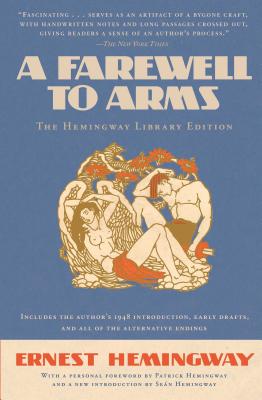Somehow, my thoughts on A Farewell to Arms by Ernest Hemingway (1929) were never recorded! I finished it quite a few weeks ago. As a novel to enjoy in my free time, A Farewell to Arms fell short. However, as a novel that perfectly captures the era in which it was written and the subtlety of its message with masterful writing, A Farewell to Arms certainly has its place. It is well deserving of its classic status, even though I personally can’t say I was a fan.
I have liked half of the Hemingway I’ve read. The Old Man and the Sea was wonderful, and I also liked For Whom the Bell Tolls. But The Sun Also Rises bored me to tears each of the (three?) times I had to read it for classes. Likewise, Hemingway’s stories are a mixed bag for me, although I readily admit his written is impressively tight.
A Farewell to Arms was more in between those extremes of emotions, for I certainly did not love it, but I also finished reading it with a deep appreciation for it and for the experience reading it. In A Farewell to Arms, a young American man (Frederic Henry) fighting with the Italian army during the first World War falls in love with a Scottish nurse. The subsequent affair is the main interest in the novel and to Lieutenant Henry and Miss Barkley, and yet the pesky war keeps coming up and getting in the way.
Hemingway’s prose is sparse as always, and this provides a degree of tension as the two sides of the narrative (the love affair and the fighting) seem to fight for center stage. Our “hero” is a tight-lipped man. He knows what is going on. But although the omnipresent narrator knows what he is feeling, for the most part, only actions are described (this is classic show, not tell prose) and we therefore feel the senselessness of the war and the hopelessness of the situation as village are evacuated and so forth.
Hemingway’s prose makes it seem so real. This type of novel is why I am glad to read fiction to learn about history. I read the history book as well, but this novel helped me understand the lost generation on a much clearer scale.
I would also like to add that A Farewell to Arms is so much better than The Sun Also Rises that I can suggest that this be the one studied in American literature courses instead! But, of course, these things are always a matter of taste. If it were up to me, I’d read For Whom the Bell Tolls.
So. Hemingway. Share a thought?




I have no thought to share because shamefully I have never read Hemmingway. Which would you recommend that I start with?
This has been on my to be read pile for over a year… I must get around to reading it!
I’m afraid I have never been a big fan of Hemingway, ever since I had to read The Sun Also Rises in high school. I thought it was so boring at the time that I have never really had a desire to read more of his books. Maybe I should try a few others just to branch out a little.